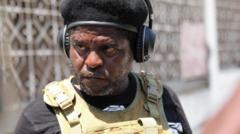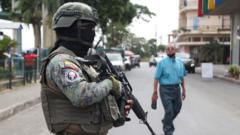As fear for their children's safety escalates in Cape Town's townships, parents like Sibahle Mbasana choose to send their kids to schools far away with better resources and security, rekindling issues of educational inequality rooted in South Africa's apartheid past.
Cape Town's Education Crisis: Parents Opt for Safety Over Proximity

Cape Town's Education Crisis: Parents Opt for Safety Over Proximity
Rising crime and violence in Cape Town's townships drive families to enroll their children in distant, formerly white-only schools.
Fears of escalating crime and gang violence in Cape Town's townships, particularly Khayelitsha, have led many parents to make the tough choice of transferring their children to safer, state schools located far from home, often in areas notorious for historical segregation. Sibahle Mbasana and her husband have opted to send their three children to a school about 40 kilometers away in Simon's Town, sparking a journey that begins before dawn each day.
Residents of Khayelitsha recount distressing stories of gang intimidation in local schools. Mbasana recalls traumatic experiences her sons faced while attending their previous school, where armed individuals often threatened teachers and students, leaving little security. Despite the end of apartheid over three decades ago, systemic inequalities in the education system persist, rooted in historical policies like the Bantu Education Act of 1953.
Khayelitsha's schools frequently face overcrowding, limited resources, and the threat of violence, resulting in parents like Mrs. Mbasana seeking alternatives for their children's education. The state school chosen offers smaller class sizes and better facilities; however, the lengthy commutes put additional stress on the children. They rise as early as 4:30 AM, juggling their studies while managing fatigue from long hours spent traveling.
This situation highlights broader issues surrounding educational disparities in South Africa, where children’s academic outcomes continue to be significantly influenced by their socio-economic background and location. The Western Cape's provincial education department has acknowledged the challenges facing township schools and has begun to address security concerns, yet many teachers express feeling unsafe and unsupported, leaving families to navigate additional emotional and logistical burdens.
As experts and advocates call for urgent attention to the plight of these students, parents like the Mbasanas are left grappling with the harsh realities of crime, transport issues, and a system that continues to underinvest in schools serving marginalized communities. With no immediate solutions in sight, the strain of balancing safety and quality education leaves countless families feeling desolate and desperate for change.


















